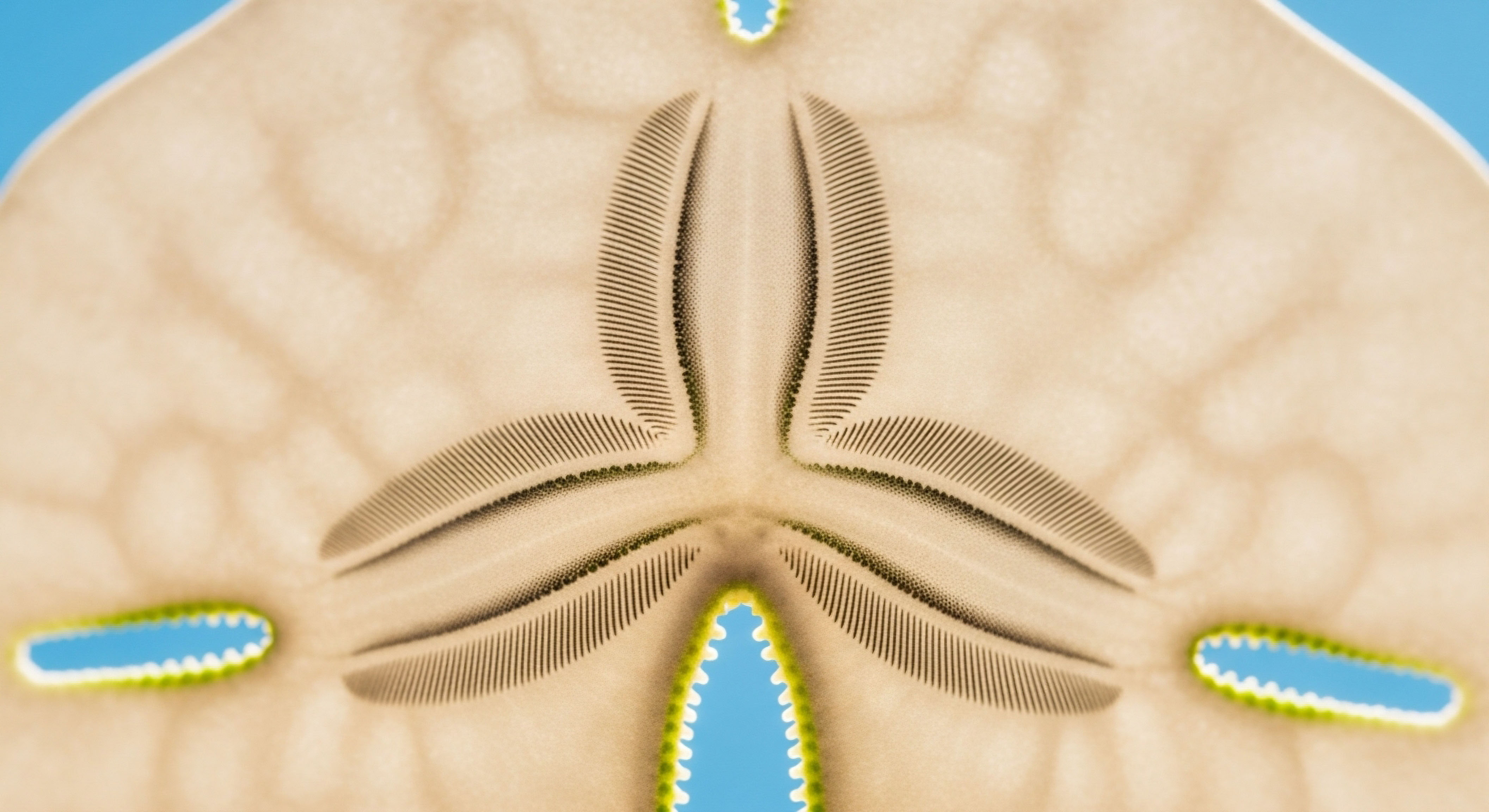

Fundamentals
You may have noticed subtle shifts in your mental clarity, a feeling sometimes described as brain fog, or a frustrating sense that your memory isn’t as sharp as it once was. This experience is a deeply personal one, and it is rooted in the intricate biological processes that govern your body.
The connection between how you feel and your internal hormonal environment is profound. Understanding this link is the first step toward reclaiming your cognitive vitality. The question of whether hormonal balance can improve cognitive resilience with age is best answered by looking at the very systems that regulate your body’s daily operations.
Your endocrine system, a network of glands producing hormones, acts as a sophisticated communication grid, sending chemical messages that influence everything from your energy levels to your mood and, critically, your brain function.
Hormones like estrogen and testosterone are far more than just reproductive agents; they are powerful modulators of brain health. These steroid hormones exert significant influence over brain regions essential for memory and higher thinking, such as the hippocampus and prefrontal cortex.
They support the growth and maintenance of neurons, the brain’s fundamental building blocks, and enhance synaptic plasticity, which is the biological basis of learning and memory. When hormonal levels decline with age, as they do during menopause for women and andropause for men, the brain’s supportive infrastructure can be compromised. This can manifest as the cognitive difficulties you may be experiencing. The feeling of mental fatigue is a valid biological signal that your brain’s metabolic and hormonal equilibrium is changing.

The Brain’s Energy Supply and Hormonal Influence
Your brain is an energy-intensive organ, consuming a disproportionate amount of the body’s glucose supply to fuel its activities. Hormones play a direct role in regulating this energy metabolism. Estrogen, for instance, helps facilitate the transport of glucose into brain cells, ensuring they have the fuel needed to function optimally.
A decline in estrogen can lead to a state of reduced energy utilization in the brain, a condition known as hypometabolism. This metabolic slowdown can impair the ability of neurons to communicate effectively, contributing to cognitive symptoms. The loss of these hormones during aging is associated with mitochondrial dysfunction, which further compromises the brain’s energy production and increases oxidative stress.
Similarly, testosterone has been shown to have neuroprotective effects, helping to shield neurons from damage and supporting their resilience. Studies have indicated that lower levels of testosterone in aging men are associated with poorer performance on cognitive tests. The decline in these crucial hormones is not an isolated event.
It is part of a systemic shift that affects the entire body, including the brain’s ability to protect itself, repair damage, and perform at its peak. Addressing these hormonal imbalances is a foundational aspect of supporting long-term cognitive health and building resilience against age-related decline.
The gradual decline of key hormones is a central factor in the metabolic and structural changes that affect cognitive function during aging.

Neuroinflammation and the Aging Brain
Another critical piece of the puzzle is the concept of neuroinflammation. As we age, our immune system can become dysregulated, leading to a state of chronic, low-grade inflammation throughout the body, including the brain. This process is exacerbated by hormonal decline. Estrogen and progesterone, for example, have potent anti-inflammatory properties in the brain.
When their levels drop, the brain’s resident immune cells, known as microglia, can become over-activated, releasing inflammatory molecules that can damage neurons. This inflammatory state is a common thread in many age-related neurological conditions and is a significant contributor to cognitive impairment.
The experience of brain fog, memory lapses, and mood changes is often a direct reflection of this underlying neuroinflammation. It is a physiological response to a changing internal environment. By understanding that these symptoms are not just a part of getting older but are linked to specific biological mechanisms, you can begin to see a path forward.
Restoring hormonal balance is a key strategy for mitigating this inflammation and protecting the brain from its damaging effects. This approach seeks to address the root cause of these changes, providing the brain with the resources it needs to maintain its structural integrity and functional capacity. It is a proactive way to support your cognitive resilience for years to come.


Intermediate
Advancing from a foundational understanding of hormonal influence on cognition, we can examine the specific clinical protocols designed to restore balance and support brain health. These interventions are grounded in the principle of biochemical recalibration, aiming to replenish declining hormone levels to a state that promotes optimal physiological function.
The goal is to move beyond merely treating symptoms and instead address the underlying endocrine shifts that contribute to cognitive decline. This requires a nuanced approach tailored to the individual’s unique biological context, whether male or female, and their specific point in the aging process.
For many individuals, this journey begins with a comprehensive evaluation of their hormonal status through detailed lab work. This provides a clear picture of their endocrine landscape, identifying deficiencies that correlate with their reported symptoms. Based on this data, a personalized therapeutic strategy can be developed.
These protocols are designed to mimic the body’s natural hormonal rhythms, providing a steady and physiologic level of support. This precision is what allows for the restoration of function without overburdening the system. It is a collaborative process between the individual and their clinician, focused on achieving measurable improvements in both subjective well-being and objective health markers.

Hormonal Optimization for Female Cognitive Health
For women navigating perimenopause and post-menopause, the decline in estrogen and progesterone is a primary driver of cognitive symptoms. Estrogen replacement therapy has been shown to preferentially protect verbal memory and can improve cognitive function, particularly when initiated in the early stages of menopause.
The neuroprotective effects of estrogen are well-documented; it supports synaptic health, reduces neuroinflammation, and modulates the activity of key neurotransmitter systems. A typical protocol may involve the use of bioidentical estradiol, delivered through a patch or gel to ensure stable serum levels. This is often complemented with progesterone, which provides its own neuroprotective and calming benefits.
In some cases, low-dose testosterone supplementation may also be incorporated into a woman’s protocol. Testosterone, while often considered a male hormone, plays a role in female health, contributing to mental clarity, energy, and libido. A subcutaneous injection of a small dose of Testosterone Cypionate, for instance, can be an effective component of a comprehensive hormonal optimization plan.
The addition of Anastrozole, an aromatase inhibitor, may be considered in certain situations to manage the conversion of testosterone to estrogen, although this is less common in female protocols. The precise combination and dosage are always tailored to the individual’s specific needs, as revealed by their lab results and clinical presentation.
Targeted hormone replacement therapies aim to re-establish a neuroprotective endocrine environment, mitigating the cognitive effects of menopause and andropause.

Testosterone Replacement Therapy for Male Cognitive Resilience
In men, the age-related decline in testosterone, or andropause, is often associated with cognitive changes, including difficulties with memory, executive function, and verbal fluency. Testosterone replacement therapy (TRT) is a well-established clinical protocol for addressing these and other symptoms of hypogonadism. The standard of care often involves weekly intramuscular injections of Testosterone Cypionate.
This method provides a consistent and reliable elevation of testosterone levels into the optimal range for young, healthy men. The therapeutic goal is to restore the neuroprotective benefits of testosterone, which include reducing beta-amyloid plaque deposition (a hallmark of Alzheimer’s disease) and supporting synaptic plasticity.
A comprehensive male protocol extends beyond testosterone alone. To maintain the body’s natural hormonal signaling pathways, adjunctive therapies are often included. Gonadorelin, a GnRH analog, is frequently prescribed to stimulate the pituitary gland, preserving testicular function and endogenous testosterone production.
Anastrozole is also a common component, used to control the aromatization of testosterone into estrogen and prevent potential side effects. For men seeking to preserve fertility or those coming off TRT, a protocol including Gonadorelin, Clomid, and Tamoxifen can be used to restart the natural production of testosterone. These multi-faceted approaches reflect a deep understanding of the hypothalamic-pituitary-gonadal (HPG) axis and its role in maintaining systemic health.

Growth Hormone Peptides and Brain Function
Beyond the primary sex hormones, other signaling molecules are critical for cognitive health. Growth hormone (GH) and its downstream mediator, IGF-1, have significant effects on the brain. The production of GH declines with age, and this decline is linked to changes in body composition, sleep quality, and cognitive function.
Peptide therapies, such as Sermorelin and Ipamorelin, offer a sophisticated way to address this decline. These peptides are secretagogues, meaning they stimulate the pituitary gland to produce and release its own GH in a natural, pulsatile manner. This approach is considered a safer and more physiologic alternative to direct injection of synthetic HGH.
Sermorelin is a GHRH analog, directly stimulating the GHRH receptors in the pituitary. Ipamorelin works through a different mechanism, mimicking the hormone ghrelin to stimulate GH release. The combination of these peptides can have a synergistic effect, promoting more robust and sustained GH release.
The benefits of optimizing GH levels extend to the brain, with potential improvements in cognitive function, sleep quality (which is essential for memory consolidation), and overall vitality. These therapies represent a frontier in personalized wellness, offering a targeted way to support the body’s regenerative processes and enhance cognitive resilience with age.
The following table provides a comparative overview of these two common growth hormone-releasing peptides:
| Peptide | Mechanism of Action | Primary Benefits | Common Use Cases |
|---|---|---|---|
| Sermorelin | Stimulates the pituitary gland via GHRH receptors to produce growth hormone. | Promotes natural, sustained release of GH, improves sleep quality, increases lean muscle mass. | General anti-aging, improving energy levels, supporting metabolic health. |
| Ipamorelin | Mimics ghrelin to stimulate GH release with high specificity and minimal side effects. | Reduces body fat, enhances muscle recovery, improves tissue repair. | Advanced fitness goals, fat loss protocols, recovery from injury. |


Academic
A sophisticated examination of cognitive resilience requires a systems-biology perspective, viewing the brain not as an isolated organ but as a node in a complex network of physiological interactions. The age-related decline in cognitive function is a multifactorial process where hormonal signaling, metabolic integrity, and immune regulation are deeply intertwined.
The loss of sex hormones, particularly estradiol and testosterone, initiates a cascade of downstream events that compromise neuronal health and synaptic function. This process is profoundly influenced by the brain’s metabolic state, which is itself dependent on hormonal cues. The convergence of endocrine decline and metabolic dysregulation creates a permissive environment for neurodegeneration.
At the molecular level, the neuroprotective actions of sex hormones are extensive. Estradiol, for example, modulates synaptic plasticity through both genomic and non-genomic pathways, activating estrogen receptors (ERα and ERβ) located in the nucleus and at the cell membrane. This activation influences gene expression related to neuronal survival, spinogenesis, and synaptogenesis.
Testosterone exerts similar protective effects, in part through its aromatization to estradiol within the brain, but also through direct androgen receptor-mediated pathways that have been shown to reduce oxidative stress and apoptosis. The decline of these hormones with age removes a critical layer of endogenous neuroprotection, leaving the brain more vulnerable to insults.

How Does Metabolic Dysfunction Accelerate Hormonal Brain Aging?
The concept of “brain aging” can be reframed as a progressive loss of metabolic flexibility and efficiency, a process significantly accelerated by systemic metabolic dysfunction and hormonal decline. The brain’s high energy demand makes it exquisitely sensitive to disruptions in glucose and lipid metabolism.
Conditions such as insulin resistance, a hallmark of metabolic syndrome, impair the brain’s ability to utilize glucose, its primary fuel source. This creates a state of cerebral energy deficit, which is a key feature in the early stages of many neurodegenerative diseases.
The loss of estrogen during menopause exacerbates this issue, as estradiol plays a crucial role in regulating glucose transport and mitochondrial function in the brain. The result is a bioenergetic crisis that compromises synaptic function and promotes cell death.
The interplay between hormonal status and brain metabolism is bidirectional. Hormonal decline contributes to metabolic dysregulation, and systemic metabolic dysfunction can further disrupt endocrine signaling. For instance, obesity, a common component of metabolic syndrome, is associated with chronic inflammation and altered sex hormone metabolism.
Adipose tissue can increase the aromatization of testosterone to estrogen in men, leading to a relative estrogen excess and testosterone deficiency. In women, the inflammatory environment created by metabolic syndrome can amplify the negative neurological effects of menopause. This creates a vicious cycle where hormonal imbalance and metabolic dysfunction reinforce each other, accelerating the aging process within the brain.

The Central Role of Neuroinflammation
Neuroinflammation is a key mechanistic link between hormonal decline, metabolic dysfunction, and cognitive impairment. In a healthy state, the brain’s immune cells, microglia and astrocytes, perform essential housekeeping functions. However, in the context of aging and hormonal loss, these cells can shift to a chronic, pro-inflammatory state.
The loss of the anti-inflammatory effects of estrogen and progesterone contributes directly to this shift. This state of heightened immune activation is further fueled by systemic inflammation originating from metabolic dysfunction. Pro-inflammatory cytokines, elevated in conditions like obesity and type 2 diabetes, can cross the blood-brain barrier and amplify the neuroinflammatory response.
This chronic neuroinflammation has several detrimental consequences for cognitive function. It disrupts synaptic plasticity, impairs the production of new neurons (neurogenesis), and can directly contribute to neuronal death. The inflammatory environment also promotes the pathological hallmarks of diseases like Alzheimer’s, such as the accumulation of amyloid-beta plaques.
Therefore, therapeutic strategies aimed at improving cognitive resilience must address this inflammatory component. Hormonal optimization protocols do this by restoring the anti-inflammatory signaling of sex hormones. Lifestyle interventions that improve metabolic health, such as diet and exercise, also play a critical role by reducing the systemic inflammatory burden on the brain.
Chronic neuroinflammation, driven by both hormonal decline and metabolic dysregulation, is a central mechanism of age-related cognitive decline.
The following table details the interconnected pathways linking hormonal decline, metabolic dysfunction, and neuroinflammation:
| Factor | Mechanism | Impact on Cognitive Resilience |
|---|---|---|
| Hormonal Decline (Estrogen/Testosterone) | Reduced neurotrophic support, impaired synaptic plasticity, increased mitochondrial dysfunction. | Decreased neuronal survival, impaired learning and memory, increased vulnerability to oxidative stress. |
| Metabolic Dysfunction (Insulin Resistance) | Impaired brain glucose utilization, increased systemic inflammation, altered lipid metabolism. | Cerebral energy deficit, amplified neuroinflammation, compromised neuronal membrane integrity. |
| Neuroinflammation (Microglial Activation) | Chronic release of pro-inflammatory cytokines, disruption of blood-brain barrier, oxidative damage. | Inhibition of long-term potentiation, reduced neurogenesis, direct neuronal toxicity. |
Understanding these interconnected systems reveals why a holistic approach to cognitive health is necessary. A strategy that only addresses one component is likely to be incomplete. Effective interventions must consider the entire neuro-endocrine-metabolic axis. This involves not only the careful restoration of hormonal balance but also the implementation of lifestyle modifications that support metabolic health and reduce inflammation. This integrated approach offers the most promising path to preserving cognitive function and enhancing resilience throughout the aging process.
Further research into the specific molecular pathways that connect these systems is ongoing. For example, the role of growth factors like IGF-1, which are influenced by both hormonal status and metabolic health, is an area of intense investigation. The interaction between sex hormone receptors and insulin signaling pathways within neurons is another critical area of study.
As our understanding of these complex interactions deepens, we will be better able to develop even more precise and personalized therapies to support cognitive longevity.
- Hypothalamic-Pituitary-Gonadal (HPG) Axis ∞ The primary regulatory feedback loop controlling the production of sex hormones. Its dysregulation with age is a central driver of hormonal decline.
- Mitochondrial Dysfunction ∞ The age-related decline in the efficiency of mitochondria, the cell’s powerhouses. This leads to reduced energy production and increased oxidative stress, which is particularly damaging to high-energy organs like the brain.
- Synaptic Plasticity ∞ The ability of synapses, the connections between neurons, to strengthen or weaken over time. This is the cellular basis of learning and memory, and it is highly dependent on hormonal and metabolic support.

References
- Resnick, Susan M. et al. “Testosterone treatment and cognitive function in older men with low testosterone and age-associated memory impairment.” JAMA 317.7 (2017) ∞ 717-727.
- Brann, Darrell W. et al. “Estrogen effects on cognitive and synaptic health over the lifecourse.” Physiological reviews 100.3 (2020) ∞ 1055-1105.
- Arevalo, M. A. et al. “The neuroprotective actions of oestradiol and oestrogen receptors.” Nature Reviews Neuroscience 16.1 (2015) ∞ 17-29.
- Mosconi, Lisa, et al. “Menopause impacts human brain structure, connectivity, energy metabolism, and amyloid-beta deposition.” Scientific reports 11.1 (2021) ∞ 10867.
- Yao, Jia, et al. “An updated review ∞ androgens and cognitive impairment in older men.” Frontiers in Endocrinology 11 (2020) ∞ 586909.
- Rettberg, J. R. Yao, J. & Brinton, R. D. “Menopause, obesity and inflammation ∞ interactive risk factors for Alzheimer’s disease.” Frontiers in aging neuroscience, 6, 134. (2014).
- Sparkman, N. L. & Johnson, R. W. “Neuroinflammation associated with aging sensitizes the brain to the effects of infection or stress.” Neuroimmunomodulation, 15(4-6), 323-330. (2008).
- Pataky, M. W. Young, W. F. & Nair, K. S. “Hormonal and metabolic changes of aging and the influence of lifestyle modifications.” In Mayo Clinic Proceedings (Vol. 96, No. 3, pp. 788-814). Elsevier. (2021).
- Goyal, N. & Longo, D. L. “The detrimental effects of aging on the brain.” The New England journal of medicine, 382(11), 1057-1059. (2020).
- Rahman, A. & Christian, H. C. “The role of the GPER1 in the central nervous system.” General and comparative endocrinology, 285, 113279. (2020).

Reflection
You have now journeyed through the intricate science connecting your hormonal health to your cognitive resilience. This knowledge is a powerful tool. It reframes the conversation from one of inevitable decline to one of proactive stewardship of your own biology.
The symptoms you may have felt are not abstract frustrations; they are signals from a sophisticated system calling for recalibration. The path forward is one of partnership with your own body, informed by data and guided by a deep respect for its complex inner workings.
Consider where you are in your own health narrative. What questions has this information raised for you? The answers are unique to your individual biochemistry and life experience. The science provides the map, but your personal journey requires a personalized approach.
This understanding is the first, most critical step toward building a future of sustained vitality and mental clarity. Your cognitive function is not a static entity but a dynamic process that you can actively support and influence for years to come.

Glossary

cognitive resilience

hormonal balance

synaptic plasticity

andropause

oxidative stress

age-related decline

cognitive health

estrogen and progesterone

neuroinflammation

cognitive decline

estrogen replacement therapy

cognitive function

testosterone replacement therapy

growth hormone

sex hormones

ipamorelin

sermorelin

metabolic dysfunction

hormonal decline

menopause




